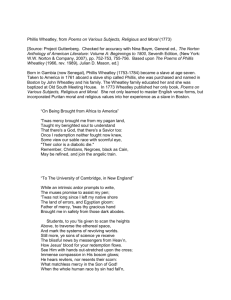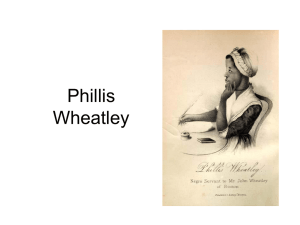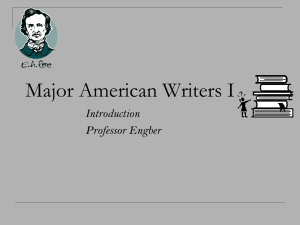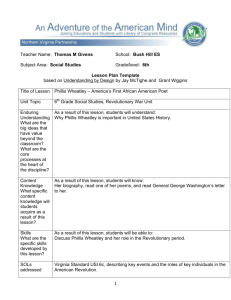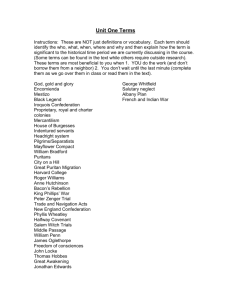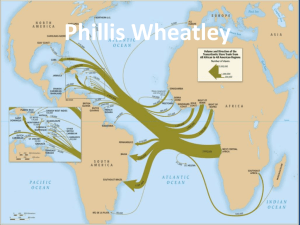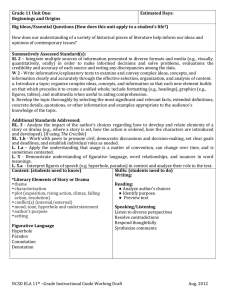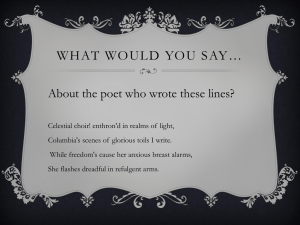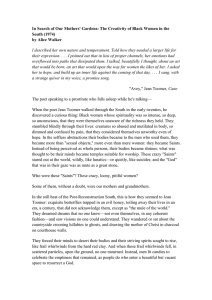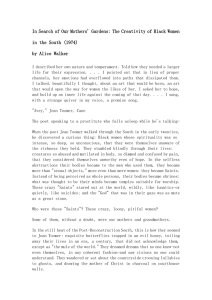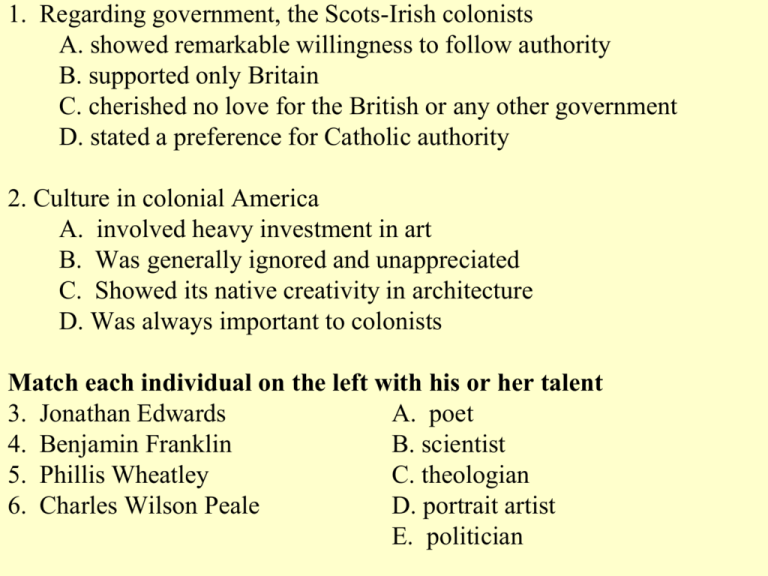
1. Regarding government, the Scots-Irish colonists
A. showed remarkable willingness to follow authority
B. supported only Britain
C. cherished no love for the British or any other government
D. stated a preference for Catholic authority
2. Culture in colonial America
A. involved heavy investment in art
B. Was generally ignored and unappreciated
C. Showed its native creativity in architecture
D. Was always important to colonists
Match each individual on the left with his or her talent
3. Jonathan Edwards
A. poet
4. Benjamin Franklin
B. scientist
5. Phillis Wheatley
C. theologian
6. Charles Wilson Peale
D. portrait artist
E. politician
Colonial Society on the Eve of
Revolution 1700-1775
THEME:
Compared with its 17th Century counterpart, 18th
Century colonial society became moore complex
and hierarchical, more ethnically and religiously
diverse, and more economically and politically
developed.
Colonial culture, while still limited, took on distinc
American qualities in such areas as evangelical
religion, education, freedom of the press and selfgovernment.
“What then is the American,
this new man?”
- Michel-Guillaume de Crévecoeur
English : Colonials
1700 - 20:1
1775 - 3:1
1775
• 2.5 million people in 13 colonies
• 90% pop. is rural
• VA, MA, PA, NC, MD are most populous
• 6% are Germans
• 7% Scots-Irish
• 20% African
• ???? Native American
• Middle Colonies most multi-ethnic
Colonial Society
European Society
Colonial Society
European Society
Ethnically Diverse
No titled nobility Christian
Social Mobility
Hierarchical
European
Skilled
Artisans/Middle Class
Limited Franchise
Nationalism
Pauperized
Underclass
Social
Stratification
Signs of Unquiet
•
•
•
•
•
•
•
•
•
War profiteering concentrates wealth
2nd & 3rd, etc. generations running out of land/room
Planters gaining wealth, small farmers squeezed
Fewer farmers, more wage-laborers
Jailbirds/deportees
More Slaves and fears of revolt
Increased Smuggling (react. to Molasses Act, 1733)
Frontiersmen alienated from governing elites
Corrupt royal appointees (countered by “the purse”)
Professions
•
•
•
•
•
•
•
•
90% people are involved in farming
Ministers
Fisherman
Sailors
Merchants
Manufacturing
Few doctors
Few lawyers
Religion and the Great Awakening
•
•
•
•
Anglicans dominant politically
Congregationalists dominant socially, esp. in NE
General religious freedom
Declining Puritan fervor Great Awakening 1730’s 1740’s
• Jonathan Edwards, “Sinners in the hands of an Angry God”
Jonathan Edwards
The God that holds you over the pit of hell, much as one holds a spider, or some
loathsome insect over the fire, abhors you, and is dreadfully provoked: his wrath
towards you burns like fire; he looks upon you as worthy of nothing else, but to be cast
into the fire; he is of purer eyes than to bear to have you in his sight; you are ten
thousand times more abominable in his eyes, than the most hateful venomous serpent is
in ours. You have offended him infinitely more than ever a stubborn rebel did his
prince; and yet it is nothing but his hand that holds you from falling into the fire every
moment. It is to be ascribed to nothing else, that you did not go to hell the last night;
that you was suffered to awake again in this world, after you closed your eyes to sleep.
And there is no other reason to be given, why you have not dropped into hell since you
arose in the morning, but that God's hand has held you up. There is no other reason to
be given why you have not gone to hell, since you have sat here in the house of God,
provoking his pure eyes by your sinful wicked manner of attending his solemn worship.
Yea, there is nothing else that is to be given as a reason why you do not this very
moment drop down into hell.
Education & Literature
• Puritans establish schools early. Why?
Primary schools est. in Middle Colonies & South
• Colleges being opened, i.e. Harvard, William &
Mary
• Artists: John Trumbull, Charles Wilson Peale, John
Singleton Copley
• Writers: Ben Franklin, Phillis Wheatley
• Printing presses & Newspapers ZENGER!!!
Phillis Wheatley
Phillis Wheatley
As a child, Phillis Wheatley was brought
from Africa and sold to a Boston couple
who came to recognize and encourage
her literary talent. Wheatley's patriotic
poetry won approval from George
Washington and praise from many
revolutionary leaders. She died free but
in poverty in the 1780s. (Library of
Congress)
Copyright © Houghton Mifflin Company. All rights reserved.
The burning of Zenger's New York Weekly Journal (Bettman Archive)
John Peter ZENGER, pp.99
•
•
•
•
•
•
•
1734-1735
Criticized corruption of royal governor of NY
Charged with seditious libel
Defended by Andrew Hamilton
Truth established as defense against libel
Bolstered freedom of the press
Found Not Guilty by jury
Monday, November, 1733:
It is indeed urged that the liberty of the press ought to be restrained because not only
the actions of evil ministers may be exposed, but the character of good ones
traduced. Admit it in the strongest light that calumny and lies would prevail and
blast the character of a great and good minister; yet that is a less evil than the
advantages we reap from the liberty of the press, as it is a curb, a bridle, a terror, a
shame, and restraint to evil ministers; and it may be the only punishment, especially
for a time. But when did calumnies and lies ever destroy the character of one good
minister? Their benign influences are known, tasted, and felt by everybody: Or if
their characters have been clouded for a time, yet they have generally shined forth in
greater luster: Truth will always prevail over falsehood.
The facts exposed are not to be believed because said or published; but it draws
people's attention, directs their view, and fixes the eye in a proper position that
everyone may judge for himself whether those facts are true or not. People will
recollect, enquire and search, before they condemn; and therefore very few good
ministers can be hurt by falsehood, but many wicked ones by seasonable truth: But
however the mischief that a few may possibly, but improbably, suffer by the
freedom of the press is not to be put in competition with the danger which the KING
and the people may suffer by a shameful, cowardly silence under the tyranny of an
insolent, rapacious, infamous minister.

